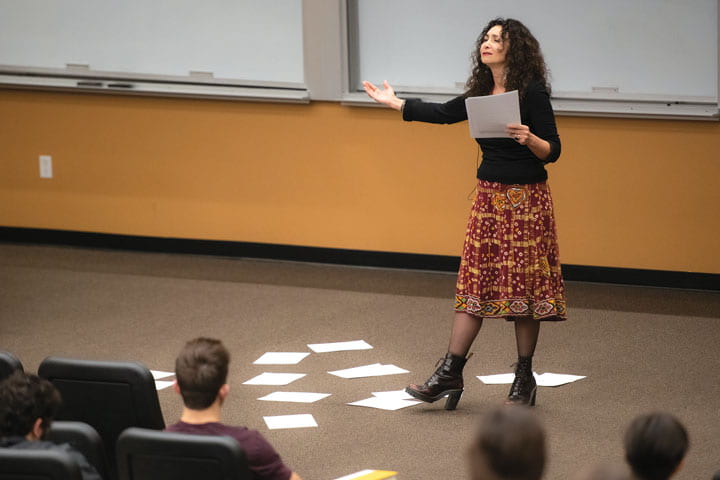
Finding Your Inner Firefly
UCI writer-in-residence shares how literature has illuminated her life’s journey
I exhausted my parents. At age 12, few things tickled me better than talking back to an adult male – preferably to one of my father’s stuffy friends who puffed up his chest and presented his opinions as pronouncements.
The place and time are Tehran, Iran, the latter part of the last century. I was the opposite of a “good” girl, the kind who courteously listened to adults and nodded in agreement with anything and everything they said. My mother believed I had swallowed too many sparrow heads, meaning I didn’t know how to hold my tongue.
At school, I refused to learn the glory-inflated history of our nation presented in badly written textbooks. Geography was wooden and boring. I disliked the upside-down way math was taught. Too many questions about anything earned me extra homework and a stern phone call to my parents. Low marks disgraced my report cards and made the lone A in literature more an act of defiance than accomplishment.
Too often I lay on my bed staring at the ceiling, contemplating my seemingly irrelevant existence. What was the use of living when no one listened to what I had to say, when no adult acknowledged my existence as a thinking being? I was a shadow on our living room wall – there and not there, someone and no one.
I devoured books. They were lanterns that floated in my bloodstream. Tolstoy, Dostoevsky, Forugh Farrokhzad, Attar, Rumi, Jane Austen, Sadegh Hedayat, Virginia Woolf and others brought to my narrow world people I otherwise never would have met, places I never would have visited. They transported me outside the cocoon that was my life. They illuminated and thrilled me with what was possible. “Possibilities” was a map folded over a thousand times. All I had to do was to open it, fold by fold.
At 13, my parents sent me to live with my aunt and grandmother in Trinidad. I had never flown on a plane, nor had I ever been outside Iran where people spoke another language. Yet the freedom seeker in me longed for that somewhere out there – a shining new world. How was I to know that I would never return to my childhood home? That a bloody revolution would devastate and devour my homeland?
My aunt in Trinidad was a midwife. She had built a maternity clinic in a tiny village called Couva. Her house was surrounded by sugar cane fields. At night, fireflies wandered in through the open window and turned my bedroom walls into a flickering universe. I loved those tiny, luminous creatures. What was it like to light up at will like that? I wanted that kind of power.
Within a week of my arrival, I was registered at the only school in the village: a Catholic girls’ school that was run by nuns – that is, white British women in habits. It didn’t matter that I was not a Catholic. I was expected to sing hymns and kneel before the cross. I was a tall and skinny girl with golden skin, wide brown eyes, curly hair and thick eyebrows. The other students – mostly Black, Indian and Chinese – had never seen a creature like me. They looked at me as if I came from another planet. I was learning English, so communication was hard. Making friends was even harder. Here I was, visible, but as an “other.” The sweet perfume of freedom reeked of loneliness.
Two years later, I was sent to a boarding school in a small southern town in England. There, my sense of “otherness” magnified. I gained weight; I lost weight. I took up smoking to be cool; I quit smoking because the stink of it clung to my hair. Everything was out of control: my tongue, my hair, my mind. I wanted to be beautiful, worldly, popular. If only I could become a firefly and light up at will. But I did not know how.
After acquiring my O-levels, equivalent to an American high school diploma, I begged my father to send me to a university in the U.S. I was sure I’d find my liberty and power in the land of the free … as if I could escape my body and enter a perfect American avatar and live happily ever after.
Shortly after I began my studies at George Washington University, young Iranian revolutionaries broke into the U.S. Embassy in Iran and took 52 American diplomats and citizens as hostages. The ordeal that lasted 444 days made Iran synonymous with terrorism. After that, going back home was not possible.
the tongue reaches
for hardness but falls
into absence.
“ ‘Possibilities’ was a map folded over a thousand times. All I had to do was to open it, fold by fold.”
I’ve had a long, meandering journey to today and now. Just as literature saved my life all those years ago, writing guided me to my inner firefly light. Translating Sufi mystic poet Attar’s “The Conference of the Birds” taught me the kind of wisdom that I had been searching for all my life. It taught me that I carried “home” within me. I have dedicated my life to writing and translating literature. If you are curious about my journey, pick up Abacus of Loss, my memoir in verse. I wrote it for you, because my journey is yours too.
Today I am a writer-in-residence at UCI. Every year, I teach a class in which I guide my students to tap into their inner power and creativity through translation of literature. It has been an immense pleasure to watch them bloom through the course of a single quarter. I look forward to my continued affiliation with this magnificent institution.
An award-winning poet, playwright and librettist, Wolpé has been a UCI writer-in-residence since 2021.